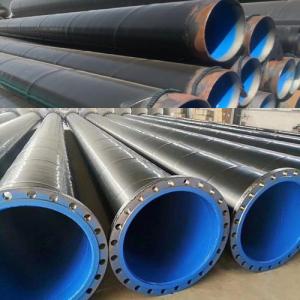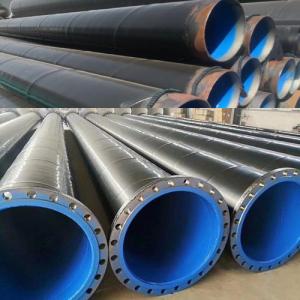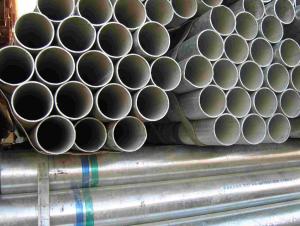Spiral Welded Plastic-coated Epoxy Resin Steel Pipe with Reinforcement Bar for Coal Mining
- Loading Port:
- China main port
- Payment Terms:
- TT or LC
- Min Order Qty:
- 100 m
- Supply Capability:
- 10000 m/month
OKorder Service Pledge
OKorder Financial Service
You Might Also Like
Spiral Welded Plastic-coated Epoxy Resin Steel Pipe with Reinforcement Bar for Coal Mining
Press grade: Maximum PN -0.097MPa
Size: DN300MM-DN1000MM
Standards:

Features:

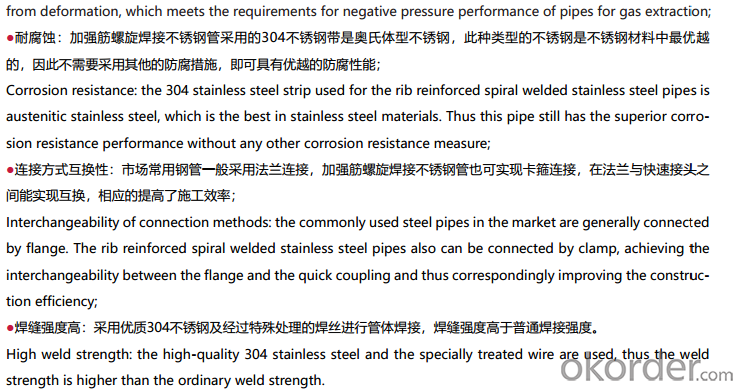
Specification:
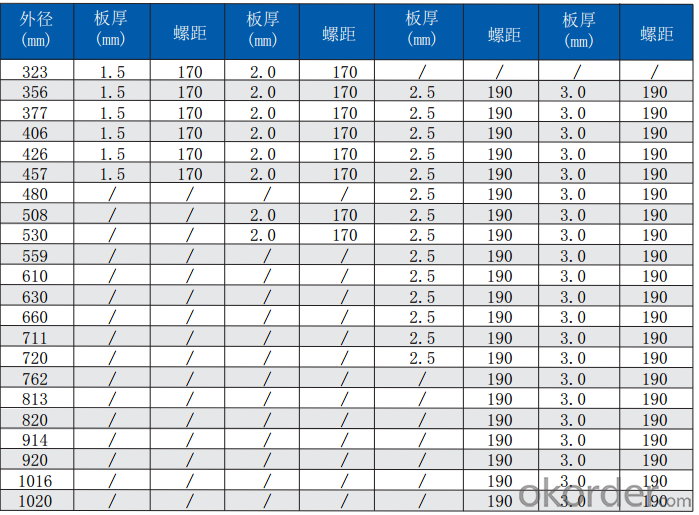
We own three industry bases for manufacturing pipes, fittings and new materials, including the biggest production line of steel wire reinforced PE composite pipe in the world, and top advanced PE pipe production line.
We get long term cooperation with leading material suppliers in the world and professionally provide the pipeline system solutions of matched products and technical cases by the whole industry chain from materials R&D to pipeline engineering installation.
- Q:How are steel pipes connected in pipeline construction?
- Steel pipes are connected in pipeline construction through various methods, such as welding, threading, and flanges. Welding involves melting the ends of two pipes together to form a strong and permanent bond. Threading involves cutting grooves into the ends of pipes, which are then screwed together using threaded fittings. Flanges are used to connect pipes by bolting them together, creating a secure and leak-proof connection. These connection methods ensure the integrity and durability of the pipeline system.
- Q:Is it good to buy a simple wardrobe or a steel pipe?
- Therefore, the simple solid wood wardrobe and steel pipe wardrobe is good or bad, according to personal preferences to set, and that environmental protection seems to have grades, easy to crack
- Q:What are the different types of steel pipe coatings for chemical processing plants?
- There are several types of steel pipe coatings commonly used in chemical processing plants, including epoxy, polyethylene, polyurethane, and fusion-bonded epoxy (FBE) coatings. Each coating offers different benefits such as corrosion resistance, chemical resistance, and enhanced durability, which are crucial for protecting steel pipes against the harsh conditions and corrosive substances found in chemical processing plants.
- Q:What are the common methods of joining steel pipes?
- The common methods of joining steel pipes include welding, threading, and using mechanical couplings. Welding involves fusing the pipes together using heat, while threading involves screwing the pipes together using threads on the ends. Mechanical couplings are devices that connect the pipes together using compression or other means.
- Q:What are the different types of thread connections used in steel pipes?
- The different types of thread connections commonly used in steel pipes include tapered threads such as NPT (National Pipe Taper), BSPT (British Standard Pipe Taper), and API (American Petroleum Institute) threads, as well as straight threads like NPS (National Pipe Straight), BSPP (British Standard Pipe Parallel), and API threads. These connections are used to ensure a secure and leak-proof joint between pipe sections or fittings.
- Q:What is the outer diameter of the steel tube?
- The diameter of a steel pipe refers to the diameter of the steel pipe. The specifications of the steel tube is normal with diameter (diameter and thickness) said, for example 100MM outer diameter and wall thickness of 5MM tube is marked with 100*5.
- Q:What are the advantages of using steel pipes in the manufacturing of furniture?
- There are several advantages of using steel pipes in the manufacturing of furniture. Firstly, steel pipes offer exceptional strength and durability, ensuring that the furniture will be long-lasting and capable of withstanding heavy use. Secondly, steel pipes are highly resistant to corrosion, making them suitable for both indoor and outdoor furniture. Additionally, steel pipes provide a sleek and modern aesthetic, adding a touch of sophistication to the furniture design. Lastly, steel pipes are relatively lightweight compared to other materials like wood or concrete, making transportation and installation easier. Overall, using steel pipes in furniture manufacturing offers a combination of strength, durability, aesthetic appeal, and practicality.
- Q:How do you repair a damaged steel pipe?
- To repair a damaged steel pipe, you can follow a few steps. First, identify the extent of the damage, such as cracks or holes. Next, clean the damaged area using a wire brush or sandpaper to remove any rust, debris, or old paint. Then, apply a suitable epoxy or sealing compound to seal the crack or hole. For larger damages, welding or brazing may be necessary. Finally, ensure the repaired area is dry and properly cured before testing the pipe for leaks or further issues.
- Q:Can steel pipes be used for underground heat exchange systems?
- Underground heat exchange systems can utilize steel pipes, which are known for their durability and strength against the pressure and environmental conditions underground. Steel is resistant to corrosion and can withstand high temperatures, allowing for efficient heat transport. Moreover, steel pipes are readily accessible and cost-effective compared to other materials, which contributes to their widespread use in underground heat exchange systems. Nevertheless, it is crucial to appropriately insulate and safeguard the steel pipes to prevent heat loss and potential harm caused by external elements like moisture or soil displacement.
- Q:How are steel pipes used in the manufacturing of ships?
- Steel pipes are used in the manufacturing of ships for various purposes, such as carrying fluids and gases, providing structural support, and facilitating efficient operation of the ship's systems. They are used for plumbing, ventilation, and firefighting systems, as well as for the construction of hulls and other vital components. Overall, steel pipes play a crucial role in ensuring the functionality and safety of ships during their construction and operation.
1. Manufacturer Overview |
|
|---|---|
| Location | |
| Year Established | |
| Annual Output Value | |
| Main Markets | |
| Company Certifications | |
2. Manufacturer Certificates |
|
|---|---|
| a) Certification Name | |
| Range | |
| Reference | |
| Validity Period | |
3. Manufacturer Capability |
|
|---|---|
| a)Trade Capacity | |
| Nearest Port | |
| Export Percentage | |
| No.of Employees in Trade Department | |
| Language Spoken: | |
| b)Factory Information | |
| Factory Size: | |
| No. of Production Lines | |
| Contract Manufacturing | |
| Product Price Range | |
Send your message to us
Spiral Welded Plastic-coated Epoxy Resin Steel Pipe with Reinforcement Bar for Coal Mining
- Loading Port:
- China main port
- Payment Terms:
- TT or LC
- Min Order Qty:
- 100 m
- Supply Capability:
- 10000 m/month
OKorder Service Pledge
OKorder Financial Service
Similar products
New products
Hot products
Hot Searches
Related keywords
